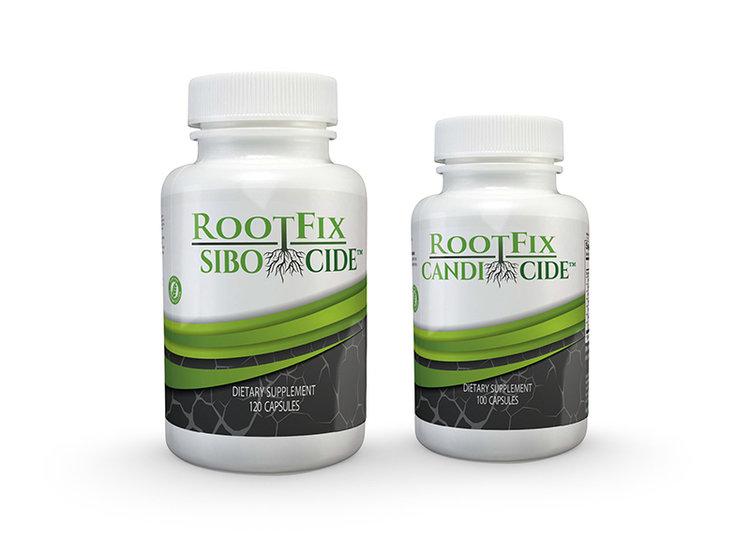This week on the GrassRoots Functional Medicine Podcast, we explored why SIBO (Small Intestinal Bacterial Overgrowth) is often behind IBS and digestive symptoms such as bloating, diarrhea, and constipation.
I wanted to follow it up with actionable strategies you can use to treat SIBO and restore balanced gut health. In this article, I’ll walk you through the framework we use when working with SIBO patients in the clinic. Please note that these steps are used in addition to comprehensive testing and a 360 degree approach to diet and lifestyle.
We take a much deeper dive when working with patients, but this will help you understand the key steps and considerations for treatment!
1. Limit Carbohydrates and Sugar
Overgrown bacteria and fungi feed off of sugars and carbohydrates (which are broken down into sugars). A temporary SIBO diet that eliminates sugar and minimizes fruits, starchy vegetables, and grains can help get SIBO under control. Focus on eating lean protein, healthy fats, leafy greens, and plenty of non-starchy vegetables.
I want to reiterate that SIBO dietary protocols are meant to be temporary because they can be quite limiting. It is important to eat a broad range of fruits, vegetables, and colors for long-term gut health.
2. Use Herbal Supplements to Pare Back Bacteria & Fungi
Before jumping to antibiotics like Xifaxan that can wipe out microbial diversity, we like to try an herbal approach first. Studies show these herbs are equally as effective at treating SIBO as antibiotics, yet they are gentle enough to minimize die-off symptoms and protect your microbiome.
Most patients struggling with SIBO also have some degree of fungal or Candida overgrowth. Treating both simultaneously yields better results in the immediacy, and can reduce the risk of recurrence.
We have found the combination of RootFix SIBOCide and Candicide to be the most effective.
You can find them bundled together (with savings!) in our SIBO and Candida Support kit.
3. Try Oil of Oregano for Stubborn SIBO
Oil of oregano contains carvacrol, an antimicrobial compound, and thymol, which helps fight fungal infections and protects against toxins. Research shows that it helps kill bacteria by breaking their cell membranes.
It is particularly effective if you have hydrogen-dominant SIBO (which can be determined with a SIBO breath test) and earlier treatments haven’t eradicated it fully or it keeps coming back. This is why we include it in our Stubborn SIBO and Candida Support Kit.
4. Avoid Lactobacillus and Bifidobacterium Probiotics
When you have an overgrowth of bacteria in your small intestine, they are often of the lactobacillus or bifidobacterium families. Unfortunately, these are the exact types of bacteria used in the most common probiotics! Taking them adds more fuel to the fire and can exacerbate your symptoms.
If you are currently taking a probiotic that contains these species of bacteria, try stopping it to notice if your symptoms improve.
5. Use a Spore-Based Probiotic Instead
Spore-based probiotics contain microorganisms that are found naturally in dirt and vegetation. Our ancestors consumed them regularly by eating produce pulled directly from the soil and enjoying traditionally fermented foods.
Spore-based probiotics have a unique ability to directly modulate the gut microbiome and clinical trials have shown they can reduce IBS and SIBO symptoms. They have also been shown to produce antimicrobial compounds, vitamins, secretory proteins, and a variety of beneficial enzymes.
In our clinic, we use a soil-based probiotic called MegaSporeBiotic that contains five extensively researched bacillus spore strains and has shown excellent results in our patients with SIBO and IBS.
6. Check for Low Stomach Acid
Your primary stomach acid, HCL, keeps your digestive system moving and helps kill off bacteria, yeast, and parasites. Low stomach acid has been associated with SIBO, Hashimoto’s and hypothyroidism, and autoimmune issues.
This free quiz can help you determine if your levels may be low. If they are, you can take an HCL supplement before meals to help you optimally digest and absorb your food
7. Get Your Stress Levels Under Control
Stress is a huge factor for many SIBO patients because it decreases stomach acid production, slows motility, and contributes to thyroid dysfunction, all of which contribute to bacterial overgrowth. Studies have also found that high levels of stress hormones make it more likely for pathogenic, or bad bacteria, to overgrow in your digestive tract.
Implementing a daily stress relief routine is one of the best things you can do for your health! To help you get started, here are 11 easy ways to relieve stress.
8. Work with a Functional Medicine Provider
As I explained in the podcast episode, SIBO isn’t always a clear cut issue. There can be a variety of underlying factors causing it and every patient responds differently to treatment.
Methane and hydrogen-dominant SIBO may require different herbs, you may need to address thyroid issues simultaneously, there could be mold issues that need to be resolved. At-home programs and specialists often suffer from tunnel vision and overlook these factors. In functional medicine, we look at the whole picture and treat the body as one interconnected system.
If you’re looking for a comprehensive approach with guidance and accountability, check out our Adaptation Programs!
About the Author: Dr. Seth Osgood is a Doctor of Nursing Practice, Board Certified Family Nurse Practitioner and Institute of Functional Medicine (IFM) Certified Practitioner. Dr. Osgood received his post-graduate training in Functional Medicine through the IFM and from working with Dr. Amy Myers. He has helped people from around the world improve their health utilizing a Functional Medicine approach.






